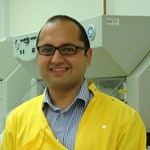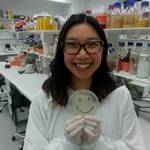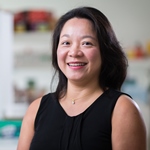People
Group Leader
Professor Jon Iredell
 Professor Jon Iredell is an Infectious Disease Physician and Microbiologist who divides his time between Westmead Hospital in a combined Infectious Diseases and Microbiology Department and his research which is supported by the NHMRC at the University of Sydney. His major interests are in critical infection, including the study of bacterial septic shock, and in bacterial genetics and ecology.
Professor Jon Iredell is an Infectious Disease Physician and Microbiologist who divides his time between Westmead Hospital in a combined Infectious Diseases and Microbiology Department and his research which is supported by the NHMRC at the University of Sydney. His major interests are in critical infection, including the study of bacterial septic shock, and in bacterial genetics and ecology.
Formal affiliations are (1) Conjoint Professor of Medicine and Microbiology, Sydney Medical School/The Westmead Institute for Medical Research and the Marie Bashir Institute, (2) Senior Staff Specialist, Western Sydney and Westmead Hospital and Deputy Director Microbiology, Pathology West (NSW Pathology) and Institute of Clinical Pathology and Medical Research, (3) Director, Centre for Infectious Diseases and Microbiology at Westmead Institute for Medical Research. An up-to-date list of publications is available via Sydney University Profiles.
Principal Research Fellow
Associate Professor Sally Partridge
 Sally is a Senior Hospital Scientist at the Centre for Infectious Diseases and Microbiology/Westmead Institute for Medical Research at Westmead Hospital and an honorary Principal Research Fellow (Faculty of Medicine) at the University of Sydney. Her main research interests and areas of expertise are in the genetics of antibiotic resistance, mobile genetic elements and plasmids in Gram-negative bacteria. She has a total >80 publications with >2000 total citations and has been/is a CI on grants totalling >$2.5 million AUD in the last 5 years. The translational potential of Sally's work since moving to Westmead Hospital in 2005 was recognised by admission to Royal College of Pathologists of Australasia in 2011 as a Founding Fellow of the Faculty of Science.
Sally is a Senior Hospital Scientist at the Centre for Infectious Diseases and Microbiology/Westmead Institute for Medical Research at Westmead Hospital and an honorary Principal Research Fellow (Faculty of Medicine) at the University of Sydney. Her main research interests and areas of expertise are in the genetics of antibiotic resistance, mobile genetic elements and plasmids in Gram-negative bacteria. She has a total >80 publications with >2000 total citations and has been/is a CI on grants totalling >$2.5 million AUD in the last 5 years. The translational potential of Sally's work since moving to Westmead Hospital in 2005 was recognised by admission to Royal College of Pathologists of Australasia in 2011 as a Founding Fellow of the Faculty of Science.
After completing her D. Phil at Oxford University Sally has become one of the leading researchers in the area of the genetics of antibiotic resistance, and has been a member of the Editorial Boards of Antimicrobial Agents and Chemotherapy since 2009 and of the Journal of Antimicrobial Chemotherapy since 2016.. She has published two major reviews in this area, FEMS Microbiol Rev. 2011, FEMS Microbiol Rev. 2009 and co-developed a valuable annotation system for antibiotic resistance gene cassettes, available at (Attacca). An up-to-date list of publications is available on Medline.
Postdoctoral Researchers
Dr Nouri Ben Zakour
 Nouri is a Principal Research Scientist in Microbial and Evolutionary Genomics at the Centre for Infectious Diseases and Microbiology-Public Health (CIDM-PH). She is a top-tier specialist in microbial and evolutionary genomics investigating the evolution of established/emerging clinical/veterinary bacterial pathogens (staphylococci, streptococci, Escherichia coli). After completing her PhD in Bioinformatics at the French National Institute for Agricultural Research in 2006, she held a post-doctoral position at the Roslin Institute, University of Edinburgh, to work on the genomic basis of host adaptation in staphylococcal species. In 2009, she joined the School of Chemistry and Molecular Biosciences at the University of Queensland as a Senior Post-Doctoral fellow, mostly working on evolutionary aspects of streptococci and E. coli ST131.
Nouri is a Principal Research Scientist in Microbial and Evolutionary Genomics at the Centre for Infectious Diseases and Microbiology-Public Health (CIDM-PH). She is a top-tier specialist in microbial and evolutionary genomics investigating the evolution of established/emerging clinical/veterinary bacterial pathogens (staphylococci, streptococci, Escherichia coli). After completing her PhD in Bioinformatics at the French National Institute for Agricultural Research in 2006, she held a post-doctoral position at the Roslin Institute, University of Edinburgh, to work on the genomic basis of host adaptation in staphylococcal species. In 2009, she joined the School of Chemistry and Molecular Biosciences at the University of Queensland as a Senior Post-Doctoral fellow, mostly working on evolutionary aspects of streptococci and E. coli ST131.
She recently joined CIDM-PH with the aim of developing research capacity in the areas of bioinformatics, microbial genomics, population genetics and evolutionary analyses, applied to multidrug resistant and/or hyper-virulent pathogens. She regularly provides bioinformatics/microbial genomics expertise to clinicians and industrial partners. She is also interested in developing new approaches to better manage genomic data and was involved in the development of widely-used bioinformatics software (BRIG, Easyfig, SeqFindr, and Contiguity). An up-to-date list of publications is available here.
Dr Muhammad Kamruzzaman

Muhammad Kamruzzaman (‘Kamal’) is a Research Scientist at the Centre for Infectious Diseases and Microbiology, Westmead Institute for Medical Research and Senior Research Fellow (Faculty of Medicine) at the University of Sydney. He worked as a CRE Research Fellow at the University of Sydney from Sep. 2011 to February 2014. His Major research expertise in the field of Bacterial genetics, mobile genetic elements (plasmids and bacteriophages) and antibiotic resistance genetics. His research work has been published in major journals such as Nature and PNAS with >1500 citations. His new research focus is on addiction systems and Entry Exclusion systems in transmissible antibiotic resistance plasmids. He has been/is a Chief Investigator of NHMRC grants totalling >$1.2 million AUD.
He completed his PhD in the field of Molecular Microbiology at Kyoto University Graduate School of Medicine, Japan in 2008 with a Monbukagakoshu scholarship (Japanese Government scholarship). He worked as an Assistant Scientist and Associate Scientist (2008-2011) at the research group of Molecular Microbiology and Ecology at the International Centre for Diarrhoeal Disease Research, Bangladesh (ICDDR,B). His research at ICDDR,B mainly focused on understanding molecular evolution and pathogenic mechanism of enteric bacterial pathogens. An up-to-date list of publications is available on Medline Research Gate and on Google Scholar citations.
Dr Alicia Fajardo Lubian
Alicia obtained her Bachelor in Biochemistry at University of Extremadura (Spain) in 2003. During her Honour Thesis she studied the L-arginige metabolism regulation by CpGs sequences in macrophages infected with Leishmania spp. In 2009, she obtained her PhD. in Molecular Biology, at the Microbial Biotechnology Department in Centro Nacional de Biotecnolog'a (CNB), Madrid, Spain. Her work was focused on understanding the structure of the networks connecting antibiotic resistance and virulence in P. aeruginosa. As a postdoctoral researcher, she has continued analyzing the impact of some particular mutations in the global transcription of P. aeruginosa. During 2012, she studied a M. Sc.in Clinical Trials Monitoring and for her work experience she joined Internal Medicine Area in Clinical Research Department in Janssen-Cilag, S.A in Madrid.
Alicia has recently joined Jon Iredell’s group as a postdoctoral researcher and her work is focused on studying the natural phenotype of commonly acquired β-lactam resistance mechanisms in Enterobacteriaceae (E. coli and K. pneumoniae). An up-to-date list of publications is available on Medline.
Dr Aleksandra Petrovic Fabijan
 Aleksandra obtained her Bachelor, Master and PhD in Biology at University of Novi Sad (Serbia). During her Master Thesis she studied antibiotic resistance of E. coli isolated from digestive tract of wild birds. She completed her PhD in Microbiology in 2016 investigating Bordetella bronchiseptica specific bacteriophages and their antimicrobial potential.
Aleksandra obtained her Bachelor, Master and PhD in Biology at University of Novi Sad (Serbia). During her Master Thesis she studied antibiotic resistance of E. coli isolated from digestive tract of wild birds. She completed her PhD in Microbiology in 2016 investigating Bordetella bronchiseptica specific bacteriophages and their antimicrobial potential.
During her PhD studies she also investigated alternative antimicrobial agents against multi-resistant Acinetobacter baumannii and Helicobacter pylori strains. During 2012-2016 Aleksandra taught practical courses in Basics of Microbiology, Bacteriology, Biofilms, Pathogen Microorganisms and Biology of Bacteriophages for BSc and MSc students. In 2016, she did a sabbatical in Bratislava (Slovakia) where she worked on molecular characterisation of chromium resistance of Gram-positive bacteria. Aleksandra recently joined Iredell’s team as a Molecular Biologist and her work is focused on bacteria-bacteriophage interaction and host response in septic patients receiving adjuvant bacteriophage therapy.
Dr Carola Venturini
 Carola is a postdoctoral researcher at the Centre for Infectious Diseases and Microbiology (CIDM) at the Westmead Institute for Medical research. She is an experienced microbiologist in the fields of infectious diseases and antimicrobial resistance. The study of the role of mobile genetic elements in the evolution of infectious bacteria is one of her main research interests. Carola graduated with distinction in Biological Sciences at the University of Wollongong where she also completed her PhD (UOW; EMAI, DPI) investigating the relationship between antibiotic resistance, virulence and mobile DNA in pathogenic E. coli. These research pursuits continued during her employment at the Australian Infectious Diseases Research Centre at UQ (2010-2013) where she studied the links between horizontal gene transfer mechanisms and pathogenicity in S. pyogenes, related to the acquisition of virulence and antibiotic resistance determinants by phage and other integrative DNA elements.
Carola is a postdoctoral researcher at the Centre for Infectious Diseases and Microbiology (CIDM) at the Westmead Institute for Medical research. She is an experienced microbiologist in the fields of infectious diseases and antimicrobial resistance. The study of the role of mobile genetic elements in the evolution of infectious bacteria is one of her main research interests. Carola graduated with distinction in Biological Sciences at the University of Wollongong where she also completed her PhD (UOW; EMAI, DPI) investigating the relationship between antibiotic resistance, virulence and mobile DNA in pathogenic E. coli. These research pursuits continued during her employment at the Australian Infectious Diseases Research Centre at UQ (2010-2013) where she studied the links between horizontal gene transfer mechanisms and pathogenicity in S. pyogenes, related to the acquisition of virulence and antibiotic resistance determinants by phage and other integrative DNA elements.
Carola is currently part of Prof. J. Iredell’s research group at WIMR leading research projects investigating the effects of antibiotic treatment on the ecology of the human microbiome and related transmissible antibiotic resistance systems in the Enterobacteriaceae. With Prof. Iredell, Carola is also looking at the development of feasible and effective bacteriophage therapy against pathogenic multi-resistant organisms. An up-to-date list of publications is available on Medline.
Hospital Scientist
Belinda Roychoudhry
Belinda has been a Hospital Scientist at the Centre for Infectious Diseases and Microbiology at Westmead Hospital since 1998. She completed her BSc. honours in Professor Adrian Lee’s Helicobacter pylori research group at the University of New South Wales in 1997. In her early years at Westmead Hospital her research areas included investigating the pathogenesis and epidemiology of Bartonella henselae. Her focus now is studying the genetics of antibiotic resistance and assisting with the development of rapid diagnostic methods. An up-to-date list of publications is available on Medline.
PhD Students
Dr Ali Khalid
 Ali is a first year PhD student under Professor Jonathan Iredell and Dr Susan Maddocks. He did his MBBS from University of Health Sciences Pakistan in 2007 and Master of Philosophy from National University of Sciences and Technology in 2011. His Masters research focused on optimizing a multiplex PCR assay that could simultaneously detect the presence of typhoidal Salmonella and quniolone resistance genes directly from the blood of patients for reliable and quick diagnosis as well as effective treatment of this potentially life threatening infection.
Ali is a first year PhD student under Professor Jonathan Iredell and Dr Susan Maddocks. He did his MBBS from University of Health Sciences Pakistan in 2007 and Master of Philosophy from National University of Sciences and Technology in 2011. His Masters research focused on optimizing a multiplex PCR assay that could simultaneously detect the presence of typhoidal Salmonella and quniolone resistance genes directly from the blood of patients for reliable and quick diagnosis as well as effective treatment of this potentially life threatening infection.
He has done research on a variety of topics in Microbiology which has been published in journals and he has also presented his work at many international conferences. He has worked as a Clinical Microbiologist for the last six years in Saudi Arabia. His current research aims to develop and optimize rational bacteriophage therapy as an alternative or synergistic to antibiotic therapy in critically ill patients to counter the widespread phenomenon of antibiotic resistance.
Alma Wu
 Alma is a PhD student supervised by Jon Iredell and Muhammad Kamruzzaman, through the University of Sydney. She completed a Bachelor of Science (Adv)(Hons) in 2017. Her Honours project, also with the same supervisors, focused on the expression and functions of common toxin-antitoxins found on plasmids in E. coli and K. pneumoniae. She is continuing this work for her PhD, with a focus on the stress response roles of toxin-antitoxin systems, and the functions of chromosomally encoded systems.
Alma is a PhD student supervised by Jon Iredell and Muhammad Kamruzzaman, through the University of Sydney. She completed a Bachelor of Science (Adv)(Hons) in 2017. Her Honours project, also with the same supervisors, focused on the expression and functions of common toxin-antitoxins found on plasmids in E. coli and K. pneumoniae. She is continuing this work for her PhD, with a focus on the stress response roles of toxin-antitoxin systems, and the functions of chromosomally encoded systems.
Associate Professor Ruby Lin
 Ruby joined Iredell lab at the end of October 2017 after a short stint in industry. She is the project manager for Iredell lab and the scientific lead for an investigator-led clinical trial involving treatment of severe Staphylococcal infections using bacteriophage therapy. Her research focus has been microRNA driven dysfunctions in eukaryotic disease model systems including mouse/rat models and humans. She was a named NHMRC Peter Doherty fellow, 2005-8 and UNSW Global postdoctoral fellow, 2009-14. She has acquired >A$5.1m in competitive funding. She has 5 seminal papers in BMJ, 1999, Nature, 2010, ATVB, 2010, PNAS, 2012 and Faseb J, 2014, all received media coverage, high impact and have high citation index.
Ruby joined Iredell lab at the end of October 2017 after a short stint in industry. She is the project manager for Iredell lab and the scientific lead for an investigator-led clinical trial involving treatment of severe Staphylococcal infections using bacteriophage therapy. Her research focus has been microRNA driven dysfunctions in eukaryotic disease model systems including mouse/rat models and humans. She was a named NHMRC Peter Doherty fellow, 2005-8 and UNSW Global postdoctoral fellow, 2009-14. She has acquired >A$5.1m in competitive funding. She has 5 seminal papers in BMJ, 1999, Nature, 2010, ATVB, 2010, PNAS, 2012 and Faseb J, 2014, all received media coverage, high impact and have high citation index.
She has presented >65 papers at >30 conferences and cross-disciplinary seminars as invited chair and speaker. She is a conjoint Associate Professor at UNSW. During her presidency at Australasian Genomic Technologies Association (AGTA), a prominent society in genomics in Australia and NZ with members from industry and academia, she implemented gender equality at its annual meetings. She is heavily involved in promoting gender balance and women in STEM through various professional networks. She continues to train honours, PhD and postdoctoral researchers. She is a regular guest lecturer at UNSW, UTS and Macquarie University. In her spare time she volunteers as the primary ethics coordinator at her kids’ school and helps P & C with fundraising events. She also does pro bono work as a career coach.
Lee Thomas
 Lee is a currently a research assistant in Professor Jon Iredell’s research group at WIMR. She is involved in research investigating the effects of antibiotic treatment and prophylaxis on the ecology of the human microbiome and also the emergence of related transmissible antibiotic resistance systems in Enterobacteriaceae.
Lee is a currently a research assistant in Professor Jon Iredell’s research group at WIMR. She is involved in research investigating the effects of antibiotic treatment and prophylaxis on the ecology of the human microbiome and also the emergence of related transmissible antibiotic resistance systems in Enterobacteriaceae.
Previously, Lee was employed by Westmead Hospital, ICPMR, in the Microbiology department where she focused on the development of rapid assays to improve turn-around-time of infection control screening. In addition, Lee evaluated new technologies and culture medias as they emerged. She also acted as intermediary between research and clinical applications with an association with the on-site research laboratory supervised by Professor Jon Iredell. Lee obtained her Masters of Science in Medicine (by Research) completed in July 2007. Title "Genetic methods for the rapid detection of medically important nosocomial bacteria."
Links to publications list of publications, Iredell list of publications, Gilbert list of publications, Kok via Medline.
Professor Jon Iredell
Director, Centre for Infectious Disease and Microbiology; Professor of Medicine and Microbiology (conj.), Sydney Medical School; Senior Staff Specialist, Infectious Diseases & Microbiology; Westmead Hospital/ ICPMR; Senior Practitioner Fellow, NHMRC
Infection and Immunity
Critical Infection / BARRD Group
Read More